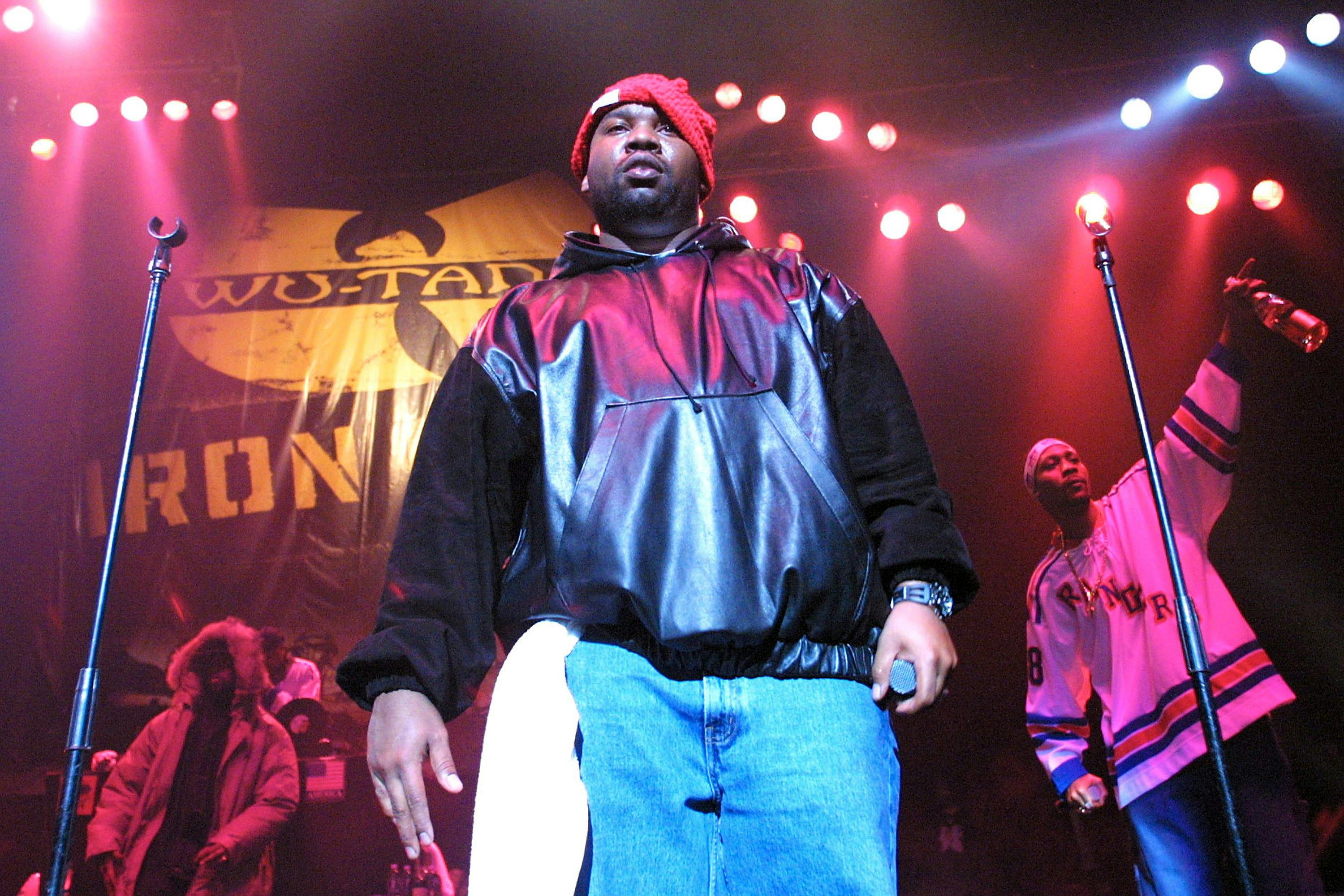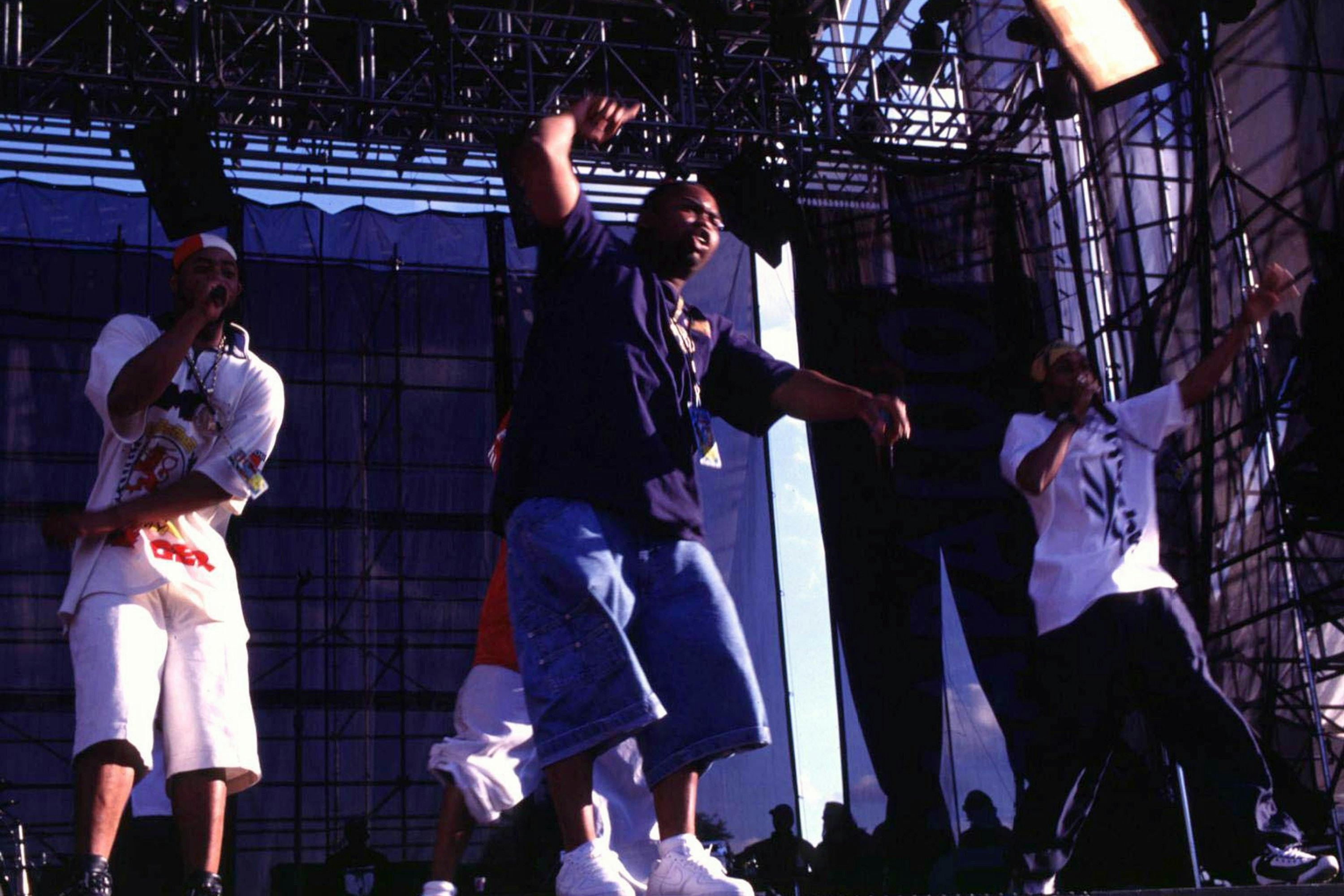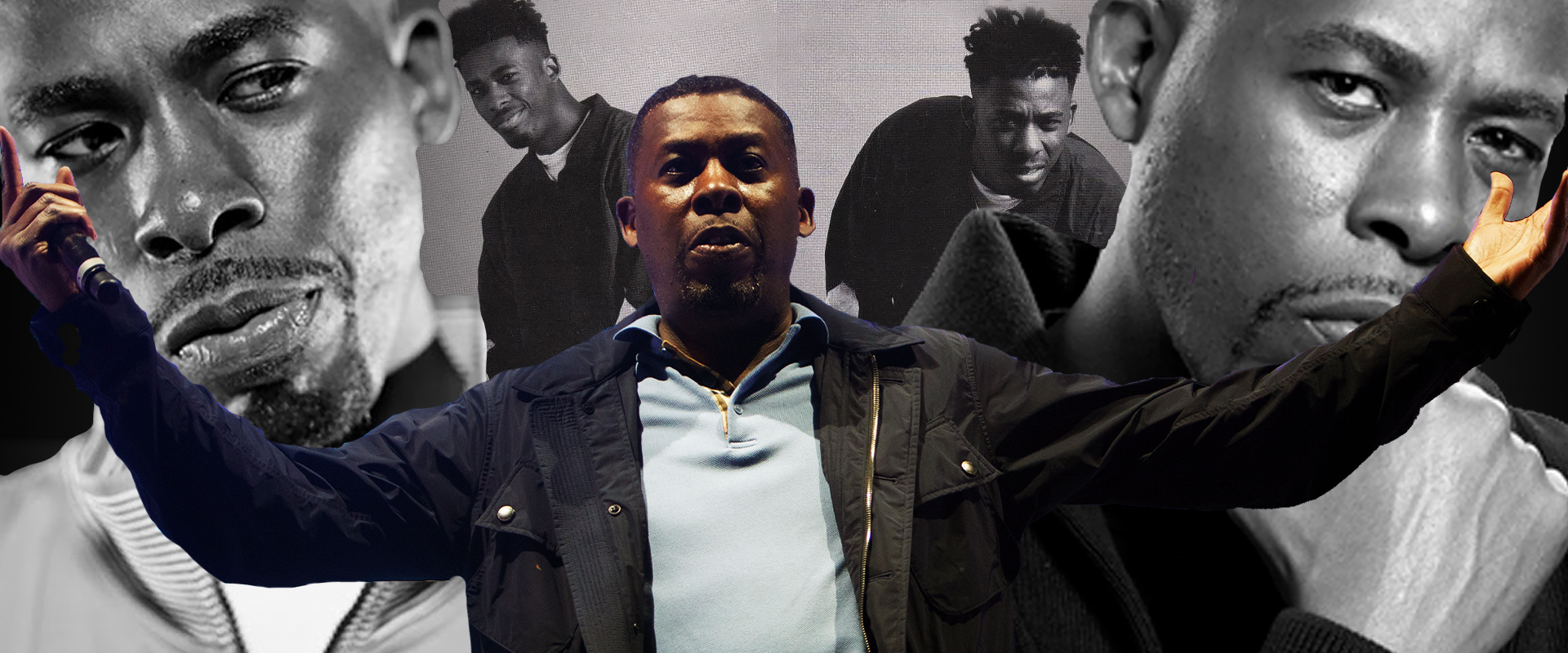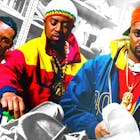
Raekwon: The Evolution of the Chef
Raekwon: The Evolution of the Chef
Published Thu, January 7, 2021 at 1:30 PM EST
It is not hyperbole to identify the Wu-Tang Clan as the greatest Hip-Hop group, ever.
The Wu was constructed to change the game, and innovation is embedded in the DNA of the 9-member crew from Staten Island. They introduced a dirtier style of production, and provided listeners with a previously unheard and fully uncensored view of life in the harsh streets of NYC’s forgotten borough. Wu-Tang Clan were trendsetters, from the music to the business. They took slang and vernacular from the Staten Island streets and 5%'er meetings, and sprinkled it throughout pop culture, and mainstream idioms (If you ask Raekwon, "When you hear rappers say, ‘yo', that was me! I started that yo shit!"). They told us to collectively diversify our bonds, all while doing the same to great success.
While other members of the Wu-Tang Clan appeared more outwardly as stars, maybe made more noise or reached a higher peak of fame, an argument can be made that when it comes to an overall body of work; Raekwon The Chef has a claim to the title of Wu-Tang MVP and recognition as the most steady, consistent, and respected member of the Wu, a title hard earned amongst a squad of killer emcees and larger than life characters. Aside from penning some of the most memorable Wu-Tang verses, Raekwon is on a 25 year run of building a solo catalog that bears-witness to a top emcee, who's influence reverberates throughout Hip Hop music, fashion, and culture.
As an emcee, Raekwon grabs, bends, tweaks, and molds language to his liking. He's like the balloon artist that inexplicably turns a handful of deflated rubber into the Eiffel Tower or an elaborate elephant.

All of the fly storytellers of today, they in one way or another are pulling from Raekwon and don't even know it sometimes,"
- Thelonious Martin, a Chicago-based producer and rabid Wu fan.
DROP YOUR EMAIL
TO STAY IN THE KNOW
"He's one of the blueprints for that visual story-telling style of rapping and I'll be forever grateful for that."
"He's a top dog," adds Pete Rock, a producer and collaborator, and a Hip-Hop luminary in his own right. "His voice just pulls you in, and it makes you listen, and then the stories that he tells are some of the most interesting that I've ever heard."
"I would flip words and say funny shit, and incorporate it with all kind of great shit," Raekwon explains to me via phone.
As he breaks down his process, I insticinctively look over my shoulder to see who might be listening. While I am the only one in the room, I listen close and carefully, feeling like I am getting an insider trading tip, or an invitation to see Houdini fuck around with handcuffs. Like many of the greats, for Raekwon, his performance is less premeditated and more muscle memory. He likens the way he sees and loves words to someone's passion for cooking.
"It was just loving what you love. It's like becoming a great cook. You don't have to measure to make food [taste] good. A lot of people think, ‘I gotta measure shit.’ Nah! If you love to cook you know what you see automatically and you sprinkle it. You sprinkle it, you wave it around, you throw it in the air. That's just what I was doing with words."
From the earliest Wu-Tang Clan recordings, Raekwon has been sprinkling his flavor onto tracks. He says things that might make sense only in that moment, connecting words into dense puzzles that can't be duplicated, but will often be repeated. His delivery, with an unmatched sense of urgency and passion, would serve as a backbone for the entire Wu-Tang Clan, with even Ghostface crediting Raekwon for inspiration during a 2020 IG Live session.
To understand Raekwon and his lasting contributions to Hip-Hop, we can look at how Rae grew up in Staten Island, and how he came into his own as a man and an MC. We can look deeper at the rich history he built in the music business as part of the legendary Wu, and the way he is currently building a non-music portfolio that tells the story of a renaissance man from the New York Times Side of Staten Island.
Let’s start with the name: Raekwon named himself Shallah Raekwon when he adopted the teachings of the 5 Percent Nation — symbolizing a new period of growth and responsibility.
"That name for me, it just matured me. I became intelligent, I became wanting to learn, I became intuitive, I didn't just think about negative energy that was around me, letting it get the best of me. I was smarter. I became respectful. It did a lot for me. That's what names are supposed to do."
Raekwon was given the nickname “The Chef” by his brothers in the Wu-Tang Clan — most specifically RZA. On the surface, it's a nod to the styles and aforementioned flavors that Raekwon brings to records.
"I was hanging with Rza pretty early, so, he knew so much about me," Raekwon explains to me about those early days when he was RZA's biggest fan — before there was a fully formalized Wu-Tang Clan to speak about. "He knew that I had so many flavors wrapped inside my lyrical pouch. He always looked at me as a guy that could rhyme over anything. Whether it's a hard beat, a soft beat, a disco beat, a 'this' kind of beat, a 'that' kind of beat, and I always wanted to not put myself in a box when it comes to music because I grew up on all kinds of music. That became something that he recognized in me and was like, 'you bring a special seasoning to the Clan and your name should be, Raekwon: The Chef.' It kind of hit off the whole Wu-Tang Clan vibe."
If the nickname stopped there, it's already the stuff of legend. But there's a flipside to the name that is less talked about and possibly overlooked.
"We were so deep into watching the karate movies. The Chef, he was nice," Rae tells me.
"He was the old man that was cooking. He liked to drink wine, and a lot of the other guys looked up to him because he was so dope. I liked it. I looked at it like that. 'You guys must look at me as one of the ones that know what time it is, and if you come over here and you tangle with me you know you're going to get something real good on that level."

We were so deep into watching the karate movies. The Chef, he was nice..."
- Raekwon
Raekwon, born Corey Woods, famously grew up in Staten Island's Park Hill Projects - a structure that was built in the 1960s as middle-class apartment, but slid into decay, and poverty in the 1970s and became not only subsidized housing but a ground zero for drug sales. It was also the home of several Wu-Tang Clan members, where Rae said he dreamt of something bigger, while becoming immune to the ills of the environment. It's where he discovered baseball, comic books, and wrestling, where he and his friends did "a lot of Fat Albert shit."
Park Hill is also where he jammed out to disco in his older cousin's apartment. It was that same apartment where he smoked his first joint and first laid ears on "Rapper's Delight", which according to Rae, both happened during the same visit. He was mesmerized by the song, as well as the vinyl's design and grooves. He heard and saw music in a new way.
"That shit flipped my wig," he says.
As groundbreaking and important as Sugar Hill was at the time, and as ubiquitous as "Rapper's Delight" became throughout the five boroughs, it was Slick Rick, Rakim, and the next generation of Hip-Hop artists that came to represent Hip-Hop for the young Chef.
"They were speaking in a way where I was able to understand the language faster," he explains. "Hip-Hop itself, it was pumping back then."
"Even for Run-DMC, I was there for all of that, it was just when these guys came around, it was just something about their whole cadence and whole style and everything they were presenting in the rhyme. It was like 'that's what Hip-Hop was to me,' to look at these guys right here. Both were great storytellers, painting pictures... All that shit was just a mountain of fly shit to me," Rae recalls.
Raekwon and his crew, which would eventually include members of the Wu-Tang Clan, started to venture off Staten Island, taking day-trips to Brooklyn to shop (and boost) for the latest styles. Soon sports gave way to breakdancing and graffiti. The missions turned into bombing exercises.
"I wanted to be a big graffiti writer. We would go places with guys that really get it in and learn how to write. I was all over the place."
They were also out looking for more than just clothes and gear though, hitting up spots referenced in songs and known in the burgeoning Hip-Hop scene, hoping to run into some of the guys they were listening to religiously like Biz Markie, Big Daddy Kane, and the aforementioned Rakim.
"When we went to Brooklyn, we would look for these guys. Not that we would hunt for them, but we knew the places they were hanging out. We'd go down to Albee Square Mall, which was this Mall on Fulton street back in the days that we would go to and we would be like 'yo, Biz just left there,' or 'Rakim and them just broke out, Kane pulled up.' For us, it was an adventure coming from Staten Island jumping on the boat to come downtown to Brooklyn. We were outside all day just loving to be in these environments."
Raekwon’s voice rises as he tells these stories. "I like where you're going with this," he mentions during our near hour-long phone conversation.
It's easy to tell that Raekwon can talk about Hip-Hop all day, from ranking MC's to the fashions and styles that have coincided with the genre. That passion is what made him stand out on the earliest Wu-Tang Clan releases and that has endeared him to fans ever since. Listening to 36 Chambers last year on a flight back from Europe, I had the thought - Jesus Christ, Raekwon is killing this album - this dude is rapping like he may never have another opportunity to rap. It may or may not be general consensus, but Rae is the MVP of 36 Chambers and his solo debut still remains a crown jewel of the Wu discography.
"I was just hungry. I just wanted it," Rae says about his appearance on those early Wu records.
"My motivation was very high at that time. I had something to prove. My guys were rooting me on. I had a family that believed in me, that was telling me I was dope. So, any time I got a chance to spray something down, I was down for it."
Wu-Tang made history for their groundbreaking record deal with Loud Records, one that allowed each solo member to sign solo deals with whatever label they chose. Method Man went to Def Jam to release TICAL. Ol' Dirty Bastard went to Elektra to release his debut, Return to the 36 Chambers: The Dirty Version. Raekwon stayed with Loud Records and Steve Rifkind to release his revered solo, Only Built For Cuban Linx.... Rifkind didn't try to sign every member of the Wu, each for different reasons, but he knew early on that he had to work with the Chef. Rifkind even threw a chair at RCA's chief lawyer when they initially refused to provide the budget for the deal (he was led out of the building in handcuffs).
"His verse on "Protect Your Neck" was amazing. His verse on "Chessboxing" was amazing. His verse on "C.R.E.A.M." was amazing. Then we came with "Heaven and Hell..." Rifkind tells me via Zoom, pausing to let that all soak in.
It's two days after the 2020 presidential election and both of us are a little bleary-eyed. But Rifkind speaks with certainty and clarity on this point, resuming with, "so it was like, I might not be the smartest guy in the world, but I'm definitely not the dumbest," he explains matter-of-factly. "That was it. Rae wanted to be on everything. His energy — he's not a bully — but he's on everything and it's like 'rah, rah, rah, let's go.'"
Rifkind has a great deal of love and respect for Raekwon. "That's little bro," he says during our call. Rifkind put his neck on the line for Wu-Tang Clan, signing that risky and groundbreaking deal and got an intimate understanding of how Raekwon fits in with the rest of the Clan. "His energy really is second to none. He's an amazing leader. He would come to the office, motivate the staff and the great thing about Rae is that he's a great listener."
Raekwon said it took time for him to go from a listener to a talker. "Back then, I wasn't the super confident guy. I was more of a sit back, laid back guy, just observing and sponging everything up, I wasn't really the talker, I was more of the listener. The listener is the learner," he tells me.
It was next to RZA that they encouraged each other, and Rae found his voice. It's one of many stories he is looking forward to sharing in an upcoming documentary and recently announced book.
"We don't talk about a lot of that with the world. How I was next to RZA when he was trying to pursue his situation," Raekwon says, explaining to me that he would regularly tell RZA, "I see something in you... I see something dope in you that you don't even know you got! But you know you got it, because you're going for it. And I'm your biggest fan. RZA, understanding that that's what I see in him, he chimed in on me like, 'you know a thing or two without even thinking that you really know it."
It got more real for Rae when RZA approached him to make a record together. "He saw things in me that was like, 'yo, you're ill too. Let's make a record.' I'm like, 'are you serious? I gotta keep up with you, you're ill.' He's like, 'you're ill too though.' That sprung into a group being created, that whole energy factor. I've never been a person to keep talking about it, but you're gonna hear me talk about it more in my documentary as well. These are things that the world don't know about me. I been spotted the talent. I spotted something in Rza that was, 'yo, you are fucking - you're that guy, you're that n**a kid!' Before he could even really get his feet wet."
Roughly ten years ago, I spent the better part of a weekend with Raekwon, creating content and music that would become the song and documentary,"Keep It Politics." Riding through Chicago, Raekwon told me something I know I will never forget. "People wonder why they fell off. I'm like, 'you fell off because you stopped. That's when you fall off!’ As long as I can keep it pushing, and keep my pen where it needs to be, I'm gonna stop when I want to stop."
Raekwon is an elite NC in part because he's never stopped. Since the 1995 release of Only Built 4 Cuban Linx..., Rae has released seven solo LP’s, and a heavy collection of mixtapes. His solo LP catalog includes stand outs like Only Built 4 Cuban Linx... and OB4CL 2, Shaolin Vs. Wu-Tang, Wu-Massacre, and OB4CL’s 1999 follow-up, Immobilarity, an album where Rae proved to himself and the world that he could put something of high quality together on his own.
“In the younger part of my career, it was always tough for me to believe that I could do it alone."
"I loved being part of a team. When I was able to validate myself as a solidified solo MC, it was a lot of pressure. I didn't know how to work by myself, I wasn't used to that. I wasn't used to having to carry the bricks by myself,” he says about putting together his sophomore LP without the constant collaboration and supervision of the Clan. “That slight little fear of becoming a solo NC was a gift and a curse. When you come from a powerful group that influenced people, they are so used to that, so used to that gift. But then that curse if you go out and challenge yourself and see if they'll still acknowledge you. And it was a thin line between that, and I had to earn those stripes. Immobilarity did that. That was the day I left the house that Rza built and wanted to build my own house.”
Raekwon has quietly built his house and continued to expand, adding new bedrooms, perhaps finishing a basement, installing accent lighting. When older artists were being left behind in the blog era, Rae adapted and released arguably some of his best work. He appeared on records with new up and coming artists, and positioned himself as a sought after co-sign and validator in his own right. Most recently and relevantly, Raekwon passed the baton to the whole Griselda Gang of Westside Gunn, Conway The Machine, and Benny The Butcher, first hitting the stage at Webster Hall in 2017 to pass them the torch in front of a sold out audience, and secondly on the intro track of WWCD, the proper debut LP from the crew that is currently running rap these days. His influence and aesthetics can be found throughout the Griselda releases, and a large majority of the boiling underground renaissance happening right now.


If you look at Wu-Tang Clan as a 9-member All-Star baseball team, Rae can hit 1-4. He's a guy that can get on base for others, or he can come through with the home run on his own. "You gotta call me The Derek Jeter on the team," Rae asserts, and it is a valid comparison. Like Jeter, he came into the game on a large stage, surrounded by incredible talent and lofty expectations. He shined as a rookie, and developed into a generationally important player. Jeter understood what it meant to be a part of the Yankees and that Yankee legacy the same way Raekwon is beholden to Hip Hop’s tenets and the legacy of the Wu. When someone disrespects Wu-Tang Clan, no matter what the internal relationship is like, Raekwon is one of the first to respond on behalf of the crew.
Jeter was famously snubbed for the MVP award in 2006, and despite a first ballot hall-of-fame career, never captured those individual accolades. And in that way, Raekwon also seems similar. He is routinely and widely recognized as a legend but has never topped those “Hottest MC Lists”, a fact that he notices but doesn’t necessarily care about.
“I laugh when dudes be like, 'who's the top 5...' I always say to myself, I respect a lot of MC'S, but I never really chimed in on wanting to be the greatest, but if I did…” he says with a laugh, leaving the rest up to the imagination, content with where he’s at and where he came from.
"I'm loving what I'm doing today because my mind is growing and it's really allowing me to paint a lot of pictures that I always wanted to paint and not necessarily music but things that fascinate me," Rae tells me as we end our near hour-long interview.
"I have a dispensary business. I have a film company. I have a wine out. I have shoes that I created... I'm doing what I always believed I could do. I have a clothing store, Purple Factory, a museum of art, fashion, and culture, those have always been the things that excited me being a guy coming out of the hood. To see those things playing out still is because I keep dreaming. I keep seeing. I keep allowing myself to say, 'I'm gonna get this done. I'm gonna do that, I'm gonna do this too and I'm gonna do that, and I'm gonna get to that."
Raekwon has a lot on his plate, and on this particular night, he's trying to squeeze in an early dinner. Before we say goodbye, our conversation comes full circle - back to those Kung Fu Flicks, back to the inspirations coming out of Park Hill.
"When you go back to those karate movies and think about those things, I guess I really am the Chef."





